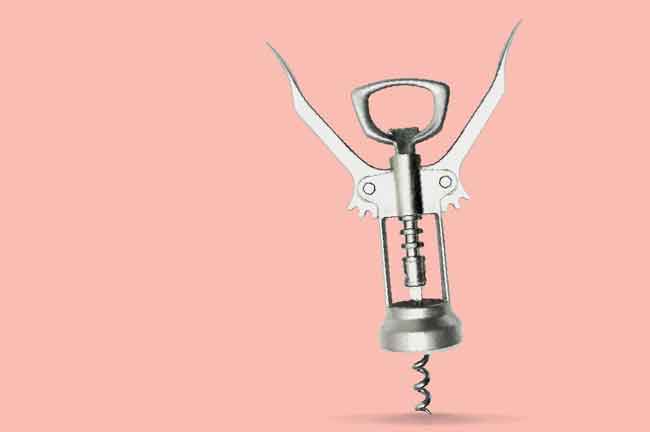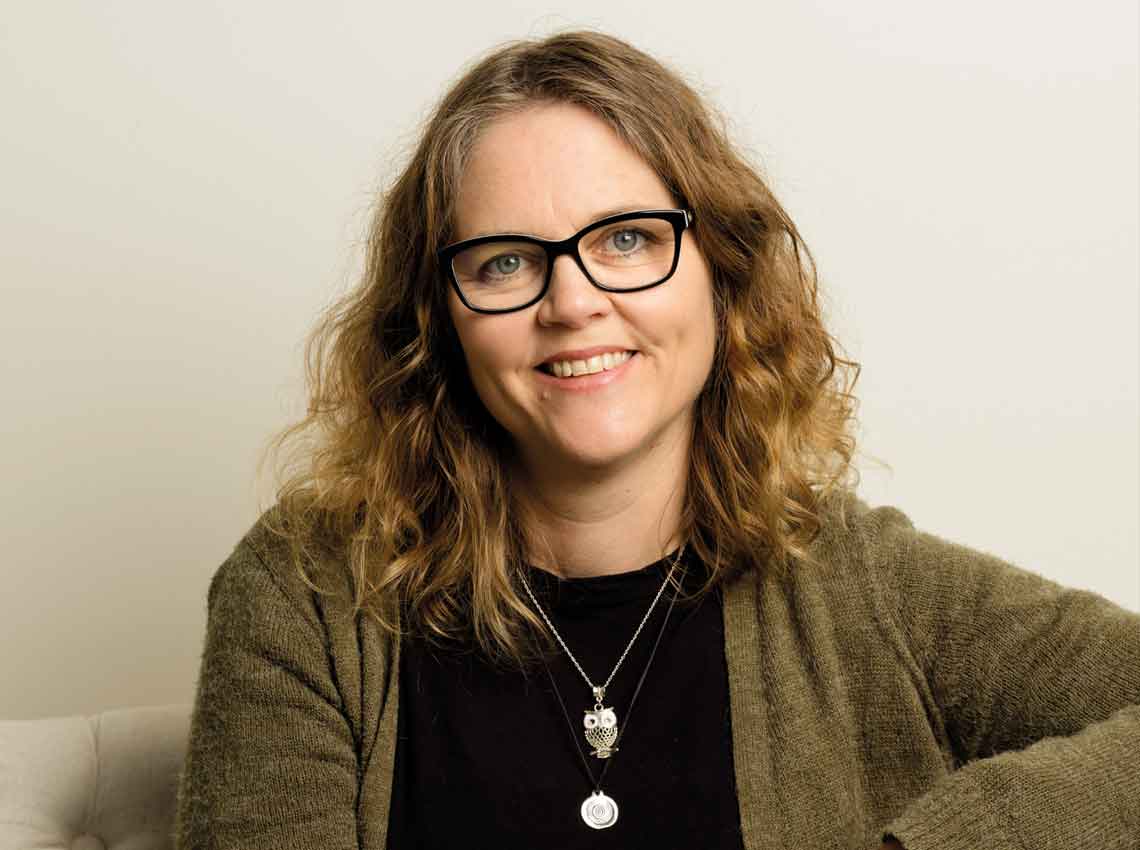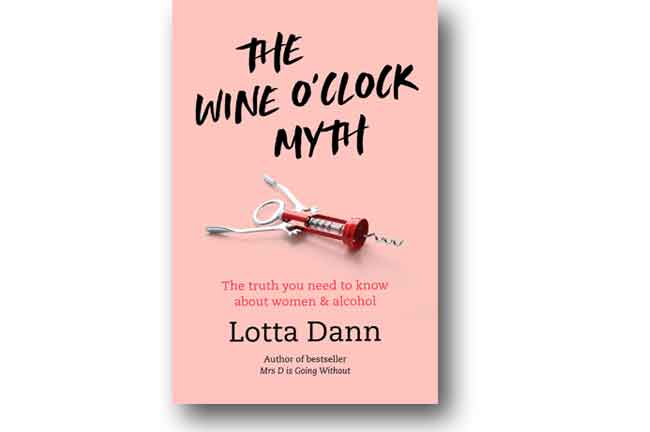The Wine O'clock myth

Sobriety advocate and author Lotta Dann’s new book is tackling the way women drink. She talks to Ruth Nichol about how the alcohol industry specifically targets women and why that matters.
Sobriety and recovery advocate Lotta Dann is getting political. For the last six years, Dann, community manager of the Living Sober website, which is run in partnership with the NZ Drug Foundation, has put her energy into providing a safe, supportive online community for people who want to change their relationship with alcohol.
“My primary focus has been on talking to people who are stuck and miserable right now.”
With almost 11,000 members, Living Sober provides a place for people to talk and bond as they grind their way through the different stages of getting sober. “It’s a community of peers. None of us are experts, we’re not trained and we come in there and talk about how we feel.”
Dann has also written two books, Mrs D is Going Without and Mrs D is Going Within, both deeply personal and honest accounts of what it’s like to go from being a boozy housewife downing a bottle of wine a day to being completely alcohol-free.
But until now, she has focused on the internal process of getting sober, the challenges of giving up booze and the many rewards that come from doing so. In her previous two books and on her popular Mrs D’s Blog on the Living Sober website, she’s avoided political discussions about the status of alcohol in society, the laws and regulations around it and the ways in which the liquor industry – what she calls Big Alcohol – works hard to make sure we keep all keep drinking.
That’s changed with her latest book, The Wine O’Clock Myth. It explores women’s drinking habits, and it takes a critical look at how the easy availability and widespread promotion of alcohol – including on social media – targets women and promotes a damaging “Wine Mum” culture.

Head and shoulders image of Lotta Dann, wearing glasses, dark clothes and a silver pendant - Lotta Dann. Photo credit: Catherine Cattanach
“What I’m trying to do with the book is to open people’s eyes to how ubiquitous alcohol has become and how it’s not harmless. There are two sets of readers. The first is people like me who are going to feel strengthened by feeling understood. I’m hoping there will also be another set of readers who are able to moderate their drinking but who will have their eyes opened and can see it’s a bit crazy that we’re living in this alcohol-saturated environment.”
She hopes that, if the second group can get a better understanding of how hard it is for the first group to moderate their drinking, they might be more receptive to the idea of greater restrictions being placed on the sale and promotion of alcohol.
In her ideal world, one of those restrictions would involve changing the law that allows alcohol to be sold in supermarkets. “I do think that alcohol should be taken out of supermarkets and there should be more curbs on the marketing messages that allow alcohol to be pushed.”
It’s not a fight she’s about to take on herself – “at the end of the day, I’m still just a sober housewife” – but she would happily back others seeking such a change as a way of signalling that alcohol is an addictive drug that needs to be treated with caution. She realises, though, that it’s unlikely to get much popular support.
“I would like the law to be changed but I understand how hard it would be. I’ve heard people describing it as like putting the toothpaste back in the tube.”
Dann is also critical of Big Alcohol’s focus on drinker education and personal responsibility as the solution to excessive drinking. She says it’s a victim-blaming approach based on the false premise that anyone can moderate their drinking if they are armed with information about the size of a standard drink and safer drinking levels.
I’m hoping there will also be another set of readers ... who will have their eyes opened and can see it’s a bit crazy that we’re living in this alcohol-saturated environment.
Lotta DannThat may work for people whose brains are wired in a way that means they will never become addicted to alcohol, says Dann, but it won’t work for people like her whose brains are wired differently. “Knowing what a standard drink was wouldn’t have made a blind bit of difference to me.”
And while we’re on the subject of Big Alcohol’s failings, she says it’s also time for the industry to acknowledge that alcohol causes cancer. Women who drink two-thirds of a bottle of wine a day are 60% more likely to develop breast cancer than non-drinkers.
“The science is unequivocal now. Epidemiologists will tell you it causes cancer, which is another reason to treat it with a bit more caution, not just for the good of people who are struggling but also for moderate drinkers.”
Dann decided to focus on women in The Wine O’Clock Myth partly because she is more familiar with the problems many women experience with alcohol, both from her own experience and from her work with the predominantly female membership of Living Sober.
“I’m a woman, and I hear from women constantly. I know the effect it’s having on us, particularly emotionally, and it devastates me.”
But she says there are also differences in the way alcohol affects woman and in how it is marketed to them. While women generally drink less than men and are also less likely to be hazardous drinkers than men, for various biological reasons. they are also more likely to be damaged by alcohol than men. Women’s generally lower body weights and higher proportion of body fat mean that, if a man and a woman drink the same amount, the woman’s blood alcohol will almost always be higher, putting her at greater risk of harm.
Women are also the target of social media campaigns promoting the use of alcohol. “The liquor industry really sets its sights on women, and it does that through social media. As an expert I interviewed in Scotland told me, women are a massive untapped market. They haven’t tapped us out yet – they know there’s more to be done.”

Book cover: The Wine o'clock myth. Red corkscrew on pink background. The truth you need to know about women and alcohol. Lotta Dann.
She says jokey memes aimed specifically at women – such as “I need a hug … e bottle of wine” or “I cook with wine, sometimes I even add it to the food” – have become a shorthand for fun, camaraderie and relaxation. And as she knows from personal experience, these kinds of memes, as well as Instagram posts by social media influencers and Facebook posts showing women friends enjoying a glass of wine together, help to normalise the use of alcohol.
When her first child was born 15 years ago, Dann was grateful for the support she got from other mothers online. But the online world had a big downside too: “It also helped enable and support what was in my case quite problematic solo drinking. I was online and alcohol was everywhere.”
As she writes in The Wine O’Clock Myth, “I was drinking alone but there’s no doubt I felt supported and encouraged in my solo habit by all the Wine Mum content pouring from my computer.”
During those years, opening a bottle of wine at 5pm and having her first glass made Dann feel connected to the adult world. It also helped her relax after a hard day wrangling children and work responsibilities and trying to meet the impossible demands of “doing it all”.
“Alcohol works in the moment, it releases dopamines, it does what we want it to. We’re humans and we like feel-good chemicals.”
But as those first two glasses turned into another two and then a whole bottle, the feel-good factor was soon replaced by other, less pleasant feelings.
“The first couple of drinks relax you, and you get that dopamine hit. Then the depressive effects kick in, the slurred speech and the muddled thinking and the slow reactions.”
Dann managed to cope with the physical effects of her excessive drinking, but it started to take an increasingly heavy emotional toll. “I just felt wretched in terms of guilt and emotional disconnection, and that’s what saved me.”
For her, the turning point came in September 2011 when she woke up one morning at 3am after drinking nearly two bottles of wine the night before and remembered that she had hidden the empty first bottle so her husband wouldn’t know how much she had drunk. She was so horrified at what she had done she decided to quit drinking. Almost 9 years later, she’s a happy sobriety advocate who, rather than pouring herself a wine at 5pm, slips into a pair of comfy trousers. Other relaxation triggers that work for her include lighting a scented candle or listening to a favourite album while she cooks.
Some of the 10 women whose stories about their relationship with alcohol feature in The Wine O’Clock Myth have had similarly happy endings. But some of them are still drinking and often quite heavily. Dann says that, while everyone has the right to choose to drink alcohol, she wants to make it easier for people to choose not to.
“I want to help create an environment that is more honest and truthful because it would make it easier for people who are struggling to put their hands up and ask for help.”
An extract from The Wine O’Clock Myth:
If I had a dollar for every time someone who has changed their relationship with alcohol said ‘If I can do it, anyone can’, I’d be a very rich woman. Those words are so frequently uttered by people who have stopped steadily drinking they’ve almost become meaningless. Which is a shame given it’s such a powerful and compelling statement. Just seven short words, but used in this context they are drenched in meaning. They convey pride and power, but also a measure of incredulity, almost as if the person uttering them can’t quite believe what they’ve done in turning their lives around. Why not? Because they genuinely thought they’d never be able to do it.
Most of us who have quit drinking used to think our booze habits were so deeply ingrained we’d never shift them. We couldn’t imagine life without our ‘best friend’, alcohol. We were terrified at the thought of resisting cravings, socialising sober, celebrating events and dealing with emotions in the raw for the rest of our lives. Perhaps we also thought our mental-health issues were too difficult to manage, or our childhood trauma too awful to get over. Whatever the circumstances surrounding our drinking, most of us genuinely thought it would be impossible to change things, and that we’d never sort it out. Until, that is, we did.
Eventually I found it on the morning after my last-ever binge. A little glimmer of hope came to me through floods of tears when I had that monumental thought, The problem isn’t me. The problem is the alcohol. I seized on that glimmer of hope, used it to tap into the tiny amount of strength I had remaining, and made my decision to quit. It was utterly terrifying. Truly, deeply terrifying. But I held onto my little inner glimmer of hope, and boosted it with the vague notion I had that it was possible to become a happy non-drinker. This I’d gleaned from looking at the occasional famous person I knew had quit. As tragic as it sounds, I’d see former drinkers like Rob Lowe and Keith Urban on the red carpet on E! channel and notice they seemed really happy. I knew they’d both quit their nasty drinking habits, yet they seemed content, smiling like life without alcohol was okay. How they’d done it, I had no idea, but they showed me that it could be done. I thought, If they can do it, I can too.
That’s the other thing to grasp onto if your personal hope and sense of self isn’t quite there yet, and your inner strength is shot. Look around and find some lamplighters—people who have quit drinking and don’t appear miserable. There are so many. Look for famous celebrities like I did if you must. Look for local television personalities or media stars. Look for people writing books (like this one!), sharing posts and photos on social media, and articles and blog posts on recovery websites. Look around in your real life—you may be lucky enough to have a role model in your extended family or community. Look for us and look hard at us. None of us are miserable about our non-drinking status. We’re not bereft; we’re just living. We’ve all done the hard work, we’ve all got to a comfortable place, and we all want nothing more but to shine a light and show others the way. Follow us on social media, get our books, listen to our podcasts, join our online communities. And constantly remind yourself, if we can do it, anyone can. Anyone.
Recent news

Reflections from the 2024 UN Commission on Narcotic Drugs
Executive Director Sarah Helm reflects on this year's global drug conference
What can we learn from Australia’s free naloxone scheme?
As harm reduction advocates in Aotearoa push for better naloxone access, we look for lessons across the ditch.

A new approach to reporting on drug data
We've launched a new tool to help you find the latest drug data and changed how we report throughout the year.

